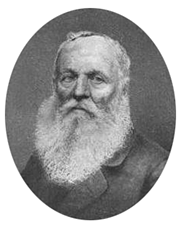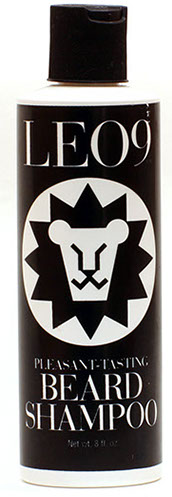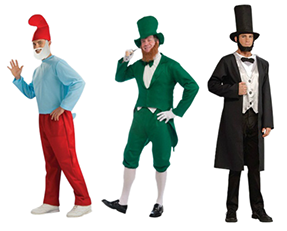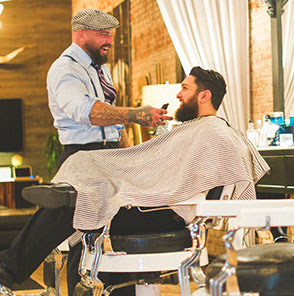


Three Key Whisker Maintenance Tips
by Bill Alley, Broadcast Host, Producer & Beard Advocate
If you are the sort that believes facial hair is a carePlus exercise in male liberation, you’re partly right. Creating and maintaining a great whiskered look comes from understanding need, sources, and discipline.
Following these tips will yield health, confidence and respect.
1. Need. Whether you have permanent facial hair or are doing the seasonal November whiskers, an image should come to you of the look you hope to achieve. This need to develop your whiskered identity will guide your regimen. Beard growth patterns reveal density, type (curled, frizzed, straight, color), and texture and determine what length of whisker you keep. Base your need on ideals—achieving the perfect look—and the realities (imperfections) to put your “best face forward.”
2. Sources. Whisker stimulation is a clear understanding of how your body works. Every day your mirrored appearance gives you clues about the feel and look of your skin, hair, nails and gut—the four zones most people seek to maintain. Proper intake of vitamins and supplemental oils and minerals for your body and elimination of high stress, risky behaviors and unhealthy vices will give facial hair maximum opportunity to grow strong and healthy.
Click gray dot for full article.
Halloween Costumes for Bearded Dudes
by MaDonna Flowers, HalloweenCostumes.com
What do you do when you have a big old beard and you’re trying to come up with a Halloween costume? You use it, of course! Embrace that facial hair and let it be part of your ensemble. There’s no reason you need to shave just for Halloween. No matter if you have a little stubble, a fine mustache, or a long flowing beard, there’s a costume choice for you. We spent some time combing through the farthest reachest of the internet for inspiration for all you whiskered gentlemen. Read the full article
The word barber comes from the Latin word barba, or beard. This ancient craft had many facets throughout history: the barber was a cutter and hair stylist whose services also included dentistry and surgery. During the Dark Ages of Europe, the barber surgeon had the primary role of treating the wounded in battle. These men were considered the first tier in medicine, living with the elite of the day, taking up residence in castles; they were also a fixture in the monastic orders. In the latter 13th Century a barber surgeon in Paris would receive formalized training at the College of St. Cosme—the root word of cosmetologist—and by the 17th century his skill rivaled medical doctors and surgeons. During the 18th century the British tried to merge the two professions, but their rivalry proved too great and the surgeons split away permanently. Con-sequently, the barber’s role of surgeon faded from practice.
Click gray dot for full article.

Joseph Palmer: Defender of the Beard
by Bill Alley, Broadcast Host, Producer & Beard Advocate
 Joseph Palmer was a War of 1812 Veteran with a strong Christian faith. He lived in a small farming community in Massachusetts in the 1820s. Palmer was a man of his own persuasion, long-bearded; the sort of man one would have seen a century before. Mocked for his archaic appearance, Palmer felt the stinging rebukes of local minister, as recorded by the historian Stewart Holbrook:
Joseph Palmer was a War of 1812 Veteran with a strong Christian faith. He lived in a small farming community in Massachusetts in the 1820s. Palmer was a man of his own persuasion, long-bearded; the sort of man one would have seen a century before. Mocked for his archaic appearance, Palmer felt the stinging rebukes of local minister, as recorded by the historian Stewart Holbrook:
“Palmer, why don’t you shave and not go around looking like the devil?”
Palmer replied, “Mr. Trask, are you not mistaken in your comparison of personages? I have never seen a picture of the ruler of the sulfurous regions with much of a beard, but if I remember correctly, Jesus wore a beard not unlike mine.”
In the spring of 1830 four men attempted to shave Palmer against his will; he outmaneuvered his attackers, wounding two in the legs. Sadly, the courts would side with the attackers when his trial was finished, landing Palmer in prison for approximately 15 months. Having done no wrong except fending off attackers, Palmer took to writing while incarcerated. What occurred to Palmer was not just the objection of the beard, but his staunch, self-reliant spirit
Click gray dot for full article.
The Origins of the Beardsley Logo
When Beardsley introduced the world's first beard shampoo in 1993 it was called LEO9.
The name was not a branding success, but the distinctive lion mark was retained as the company emblem, and it has appeared on all Beardsley products ever since. The logo is loosely based on a design in the book Visual Elements 1: Pictograms, Rockport Publishers, 1988.

OCTOBER 2016 EDITION

Evolution of a Noble Profession

EDITORIAL
The Origins of the Beardsley Logo
When Beardsley introduced the world's first beard shampoo in 1993 it was called LEO9. The name was not a branding success, but the distinctive lion mark was retained as the company emblem, and it has appeared on all Beardsley products ever since. The logo is loosely based on a design in the book Visual Elements 1: Pictograms, Rockport Publishers, 1988.
x
Three Key Whisker Maintenance Tips
by Bill Alley, Broadcast Host, Producer & Beard Advocate
If you are the sort that believes facial hair is a carePlus exercise in male liberation, you’re partly right. Creating and maintaining a great whiskered look comes from understanding need, sources, and discipline.
Following these tips will yield health, confidence and respect.
1. Need. Whether you have permanent facial hair or are doing the seasonal November whiskers, an image should come to you of the look you hope to achieve. This need to develop your whiskered identity will guide your regimen. Beard growth patterns reveal density, type (curled, frizzed, straight, color), and texture and determine what length of whisker you keep. Base your need on ideals—achieving the perfect look—and the realities (imperfections) to put your “best face forward.”
2. Sources. Whisker stimulation is a clear understanding of how your body works. Every day your mirrored appearance gives you clues about the feel and look of your skin, hair, nails and gut—the four zones most people seek to maintain. Proper intake of vitamins and supplemental oils and minerals for your body and elimination of high stress, risky behaviors and unhealthy vices will give facial hair maximum opportunity to grow strong and healthy.
Organic, local grown foods and supplements, as well as knowing your ethnic nutritional disposition, gives you expert wisdom in overall health and wellness.
3. Discipline. Maintaining great facial hair means body maintenance. Good rest and healthful, movement-energizing exercise moves and digests the good intake sources which stimulates growth, flexibility and 'glowing' appearance. Do this in tandem with cleansing, conditioning, massage and combing of your facial hair as needed; determine when your beard is looking lifeless, excessively coarse or oily, itchy or dry to plan your corrective action. Executing your daily plan develops a radiant, confident style which defines your unique, manly mane.
x
The word barber comes from the Latin word barba, or beard. This ancient craft had many facets throughout history: the barber was a cutter and hair stylist whose services also included dentistry and surgery. During the Dark Ages of Europe, the barber surgeon had the primary role of treating the wounded in battle. These men were considered a first tier in medicine, living with the elite of the day, taking up residence in castles; they were also a fixture in the monastic orders. In the latter 13th Century a barber surgeon in Paris would receive formalized training at the College of St. Cosme—the root word of cosmetologist—and by the 17th century his skill rivaled medical doctors and surgeons. During the 18th century the British tried to merge the two professions, but their rivalry proved too great and the surgeons split away permanently. Consequently, the barber’s role of surgeon faded from practice.
As facial hair enjoys times of preference and powerful comeback (most notably in this century), Barbers have been able to promote an old and honored service to the whiskered in both presentation and respect, becoming the inspired artisans who make each beard and moustache unique. The barber shop equally serves as a common gathering place for conversation and the exchange of ideas between men. Barbershop Books is one current idea born from one shop as educator Alvin Irby discovered a huge literacy gap in young African-American pre-teen males. Decisive action by providing books in establishments to encourage reading comprehension has taken hold while community support flourishes through awareness and donations.
x
2019
2018
2017
2016
ISSUE ARCHIVE
x
Joseph Palmer: Defender of the Beard
by Bill Alley, Broadcast Host, Producer & Beard Advocate
Joseph Palmer was a War of 1812 Veteran with a strong Christian faith. He lived in a small farming community in Massachusetts in the 1820s. Palmer was a man of his own persuasion, long-bearded; the sort of man one would have seen a century before. Mocked for his archaic appearance, Palmer felt the stinging rebukes of local minister, as recorded by the historian Stewart Holbrook:
“Palmer, why don’t you shave and not go around looking like the devil?”
Palmer replied, “Mr. Trask, are you not mistaken in your comparison of personages? I have never seen a picture of the ruler of the sulfurous regions with much of a beard, but if I remember correctly, Jesus wore a beard not unlike mine.”
In the spring of 1830 four men attempted to shave Palmer against his will; he outmaneuvered his attackers, wounding two in the legs. Sadly, the courts would side with the attackers when his trial was finished, landing Palmer in prison for approximately 15 months. Having done no wrong except fending off attackers, Palmer took to writing while incarcerated. What occurred to Palmer was not just the objection of the beard, but his staunch, self-reliant spirit flourishing in the Transcendentalist movement—a following that believed in the strength of the individual as superior to the following of selected leaders promoting a collective; thereby, he was against the predominant Unitarian Church mindset.
With such determination it is recorded that each side antagonized the other to the point where Palmer noted his daily conditions suffered under the custody of Sheriff of Worcester County, and in turn, his jailers treated him with ever-increasing cruelty and contempt. Palmer became advocate for the other inmates and the deplorable conditions found there; the embarrassment for law enforcement of holding an innocent man and exacting unusually cruel treatment led to pleas for Palmer to pay the fine imposed for release. As a man of character, he flatly refused, being approached numerous times in the summer of 1831 to give in to the reduced facial hair requirement, until in late August of that year he expired—still fully bearded.
x
